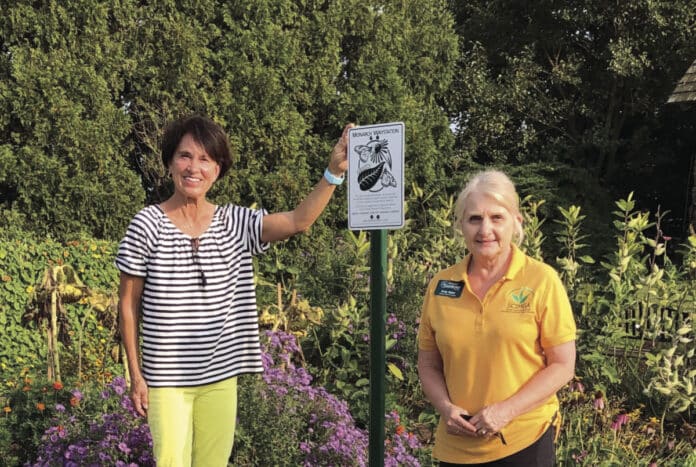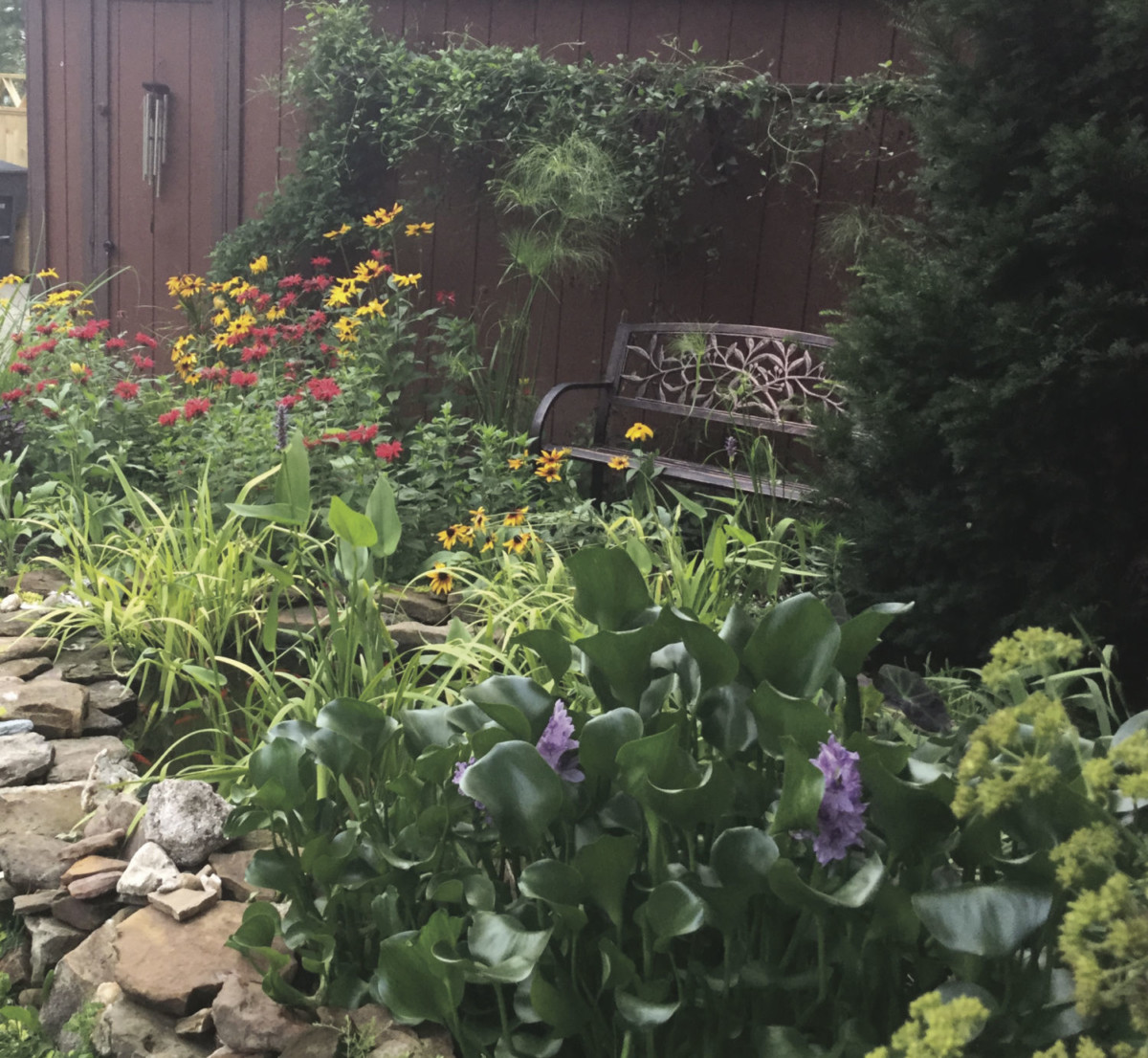
They are students of nature, learning as they go and sharing what they learn.
Nearly 30 individuals from Bartholomew and three neighboring counties have found common ground in the appreciation of Indiana’s soil and the flowers and plants that grow in it.
They are master gardeners, participants in a program launched statewide in 1978 by the Purdue University Cooperative Extension Service.
The South Central Indiana Master Gardener Association (SCIMGA) is open to residents of Bartholomew, Brown, Decatur, Jackson and Jennings counties. They are among 40 counties statewide with active master gardener programs that boast a combined 2,700 members.
The local association, founded five years ago, strives to promote the art, science and pleasure of home gardening. Members do so by:
• Increasing their own knowledge of new and research-based gardening practices through informative monthly meetings and programs, special activities and workshops.
• Fostering the exchange of experiences, ideas and friendly relationships among members.
• Providing the community with information through educational presentations.
They do it by getting their hands dirty.
Local members often invest 20 or more hours a week during the growing season — volunteering their time primarily to plant and maintain the gardens at the Henry F. Breeding Farm, Edinburgh, a 150-year-old property operated by the Bartholomew County Historical Society.
Soon after the launch of the local master gardeners association, it began a partnership with the county historical society to establish and maintain gardens at the agricultural property for educational purposes.
It began with a perennial garden in 2017 near the 1870s brick home. Herb and demonstration gardens were subsequently added, allowing the public to see and learn about plants from Indiana’s rural past.
Emily Baker grew up on a farm in Salem, Ohio, where “everyone had a garden.”
During her college years, Baker grew vegetables and flowers – including ones used for her own wedding 48 years ago.
Now retired for two years after a 37-year teaching career with Bartholomew Consolidated School Corp., the final 24 at Parkside Elementary, the 68-year-old Baker has more time for leisure pursuits such as gardening.
Baker became a master gardener in 2018, envisioning her involvement as an opportunity to formulize what she could learn about gardening, including a stewardship of the soil.
The flower garden she maintains behind her central Columbus home near Donner Park reflects Baker’s deep interest in vegetables and herbs.
Additionally, she spends time volunteering in the gardens at the Henry F. Breeding Farm and Foundation for Youth in Columbus.

Whether it’s selecting the right plants for the type of soil they’re growing in, providing just enough water or the right amount of sunlight or shade, gardeners face a variety of challenges.
For Baker, an additional challenge became keeping the neighborhood rabbits from enjoying all of the fruits of her labors, which fencing and later a stone wall added by husband Bill helped control.
Fellow master gardener Chuck Burkart found his own set of challenges.
When Burkart and wife Mary Ellen moved to the north side of Columbus four years ago from his native Illinois, their Princeton Park property provided gardening surprises below the surface.
With soil consistency that is 85 percent sand, requiring a lot of water and nutrients, Burkart’s ground was a stark contrast to the “black gold” so prevalent in the farm fields of Illinois.
But after developing a better understanding of the soil on his new property, Burkart began choosing plants that grow better in dry, sandy soil – such as the prickly pear cactus, native to Indiana, which he planted alongside his newly built home.
Burkart had developed an interest in gardening early during visits to his grandfather’s farm in Allegan, Michigan, where red raspberries left fond memories.
After 42 years in the pressure-sensitive label industry, Burkart — now 72 and five years into retirement — finds himself immersed in gardening. A master gardener since 2018, Burkart is laser-focused on true native Indiana plants and the important role they play as pollinators.
“We have destroyed 99 percent of the native prairies and meadows since the 1830s,” Burkart said, describing the impact from the development of farmland, buildings and roads.
Lost in the process were many pollinator plants, which produced a significant portion of the food supply with vegetables, nuts and fruits, Burkart said.
A true native plant attracts bugs, birds and animals – the circle of life – such as when Monarch butterflies flock to milkweed plants.
“Ninety percent of our flowers need pollination,” said Burkart, who just completed a one-year term as a SCIMGA board member, so he commits time restoring native Indiana pollinator plants to south central Indiana.
For example, Burkart plants natural wildflowers in many of the Bartholomew County Park and Recreation system’s 12 parks. Additionally, he volunteers at Brown County State Park, the Breeding Farm and maintains the wildflower garden for the Princeton Park Homeowners Association.
Chris Grunden, 69, is also all-in on gardening.
Grunden, who has lived in Columbus the past 30 years, maintains a backyard patch at her westside home, where she grows vegetables and perennials. But it’s also where invasive species are choking out some of the native Indiana plants, which triggered her interest in the master gardener program.
Grunden is among SCIMGA’s newest members, joining in February as a master gardener intern – the status of someone working toward meeting all of the requirements to become a certified master gardener. Seven years into retirement as a licensed practical nurse, Grunden entered the 14-week, fall 2020 master gardener training program conducted by Cora Carter, Purdue Extension Bartholomew County agriculture and national resources educator.
Besides working in her own garden, Grunden frequently spends time at Veritas Homestead, the small Ogilville farm operated by her son and daughter-in-law, Dan and Amber Grunden, the executive chef and pastry chef respectively at Harrison Lakes Country Club. The farm provides organic vegetables, fruit and herbs for the country club’s menu.
“I just spent all afternoon out there, sitting in the dirt and pulling carrots. It’s definitely my happy place,” Chris Grunden said. “There’s nothing like taking a big bowl out and picking your supper.”
She is also part of a group, the Cooperative Invasive Special Management Area, developing a plan to eliminate invasive species in Blackwell Park, a pollinator park on the city’s north side.
For Baker, Burkart and Grunden, becoming a master gardener was part of their personal philosophies to be lifelong learners.




